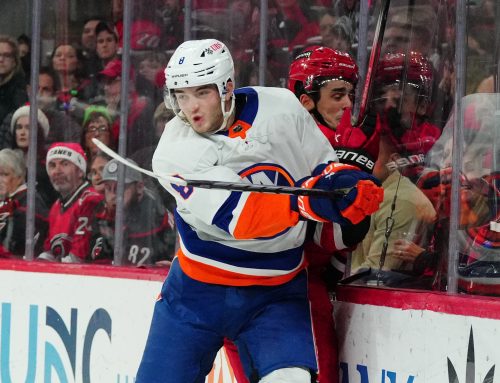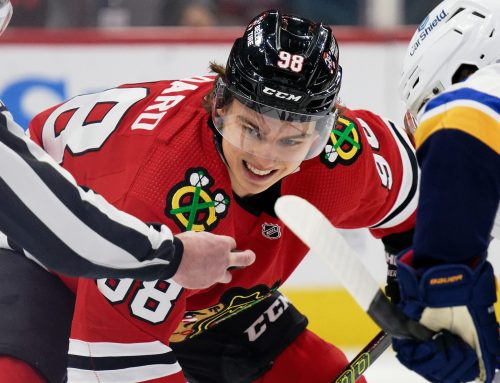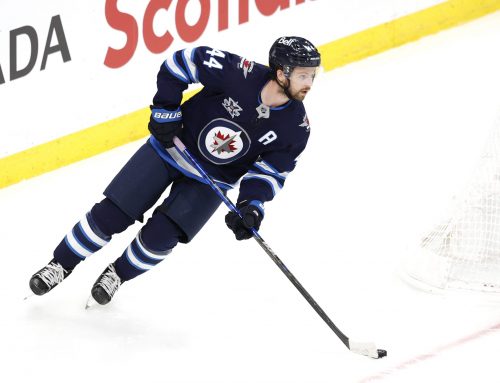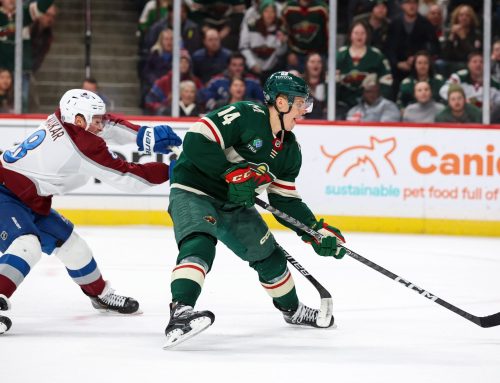Goldipucks and the Three Netminders: Andrei Vasilevskiy, Anton Forsberg & Jake Oettinger
Rick Roos
2022-06-08
Welcome to a special edition of Goldipucks and the Three Skaters, a play on words of the Goldilocks and the Three Bears story. For just the third time ever, the column is shifting gears to cover goalies instead of skaters, giving you Goaliepucks and the Three Netminders.
The positional focus might be different this time, but the rest of the column is unchanged in that instead of there being three bowls of porridge, I cover three players – here goalies – and declare one too hot (i.e., doing unsustainably better than he should), another too cold (i.e., doing unsustainably worse), and a third “just right” (i.e., producing where he should be). In addition, I also assign each a rating of 1-10, indicating how hot (rated 7-10, where 10 is the most unsustainably hot), cold (rated 1-4, where 1 is the most unsustainably cold), or “just right” (rated 4-7, where 5.5 is the most “just right”) he is.
The three goalies dissected here are Andrei Vasilevskiy, Anton Forsberg and Jake Oettinger. Even though this isn't the usual Goldipucks column, the challenge to you, the readers, remains the same, namely to consider those names and try to predict which of the three was, for 2021-22, too hot, too cold, and just right, before reading further to see if you know your goalies as well as you do your skaters.
Selected in the first round by Tampa back in 2012 despite them having just traded for up and coming goalie Ben Bishop, by the 2016-17 season Vas had shown the team enough to seize the starting gig and make Bishop expendable. Since then all Vasilevskiy has done is won 15 games more than the any other NHL goalie. In that same span, no one else who has played more games has a SV% over .915, versus .920 for Vas, or a GAA under 2.71, versus 2.49 for Vas. But after being considered the surest thing when it comes to goalies in years, this season saw Vasilevsky post his worst SV% since becoming a starter. Could we be witnessing him come back to earth, or was this just a case of getting readjusted to an 82-game slate? Signs seem to suggest not only might Vas' best days be behind him, but he could do even worse in 2022-23 than he did this season.
Amazingly when considering the shortened seasons for 2019-20 and 2020-21, Vasilevsky was able to keep intact a streak of 30+ win seasons, giving him a total of five by age 27. In the modern era, only four other goalies had that many by that age including all-time greats Martin Brodeur and Henrik Lundqvist, but also Cam Ward and Marc-Andre Fleury. If we look at the numbers, Vas has more in common with the latter two than the first two, who both had GAAs well less than his. Age 27 was when Ward started to go downhill, while for Fleury he continued racking up wins thanks to the team for which he played, but he never had a single season with even 60% quality starts. These comparisons do raise worries that Vasilevskiy's best days could already be behind him.
Vas has thrived on being a goalie able to shoulder a heavy workload, but looking at his save percentage on various amounts of rest, there are concerning signs. In 2021-22 his SV% with one day of rest, which is often what a workhorse goalie receives, was just .911, with it improving for two days rest and further increasing for three, before dropping for four or more. The same was true in 2019-20, while in 2017-18 and 2018-19 it was above .920 no matter how many days rest he received. Although it might've been easy to look past 2019-20 due to the COVID disruption, seeing this recur is troublesome.
Another indication that Vasilevskiy seems to the slipping is his shutout rate. After tallying just over one in every eight starts in the 2017-18, 2018-19 and 2020-21 campaigns, Vas had a mere two in 63 games for 2021-22. Again, this might've been something poolies could disregard were it not for similar data for 2019-20, when he had a mere three in 52 games, signifying worrisome data in two of the past three seasons as was the case for the number of days rest. One bad season is an aberration; two out of the last three is a trend.
What also cannot be ignored is how poorly Vas played as 2021-22 unfolded. Seeds of this issue were planted in 2020-21, when his Q4 stats were 2.90 GAA, .903 SV% and 40% QS%, while for this year he played poorly as well, but this time it started earlier, with a SV of .910 and GAA of 2.57 in Q3 and then .909 and 2.83 in Q4. For 2021-22 that encompassed a total of 36 starts, with 24 starts coming in Q4 alone, and three of his seven Really Bad Starts being in his last 17 games.
What this seemingly suggests is Vasilevskiy no longer being able to sustain strong play as the season unfolds if asked to carry a heavy load, which is a problem since the Lightning have to count on him to do so every campaign because their cap situation does not allow for them to sign a higher quality back-up. This season, in fact, he played in a higher percentage of games than in any campaign since 2016-17, which, coincidentally, saw him post his worst GAA and worst – tied – SV% of his career. On top of that, Vasilevskiy's even strength SV% for 2021-22 was his worst since that same 2016-17 season. Plus, a whopping 23 goalies who played 35+ games had a high danger SV% better than Vas', versus only two last season.
Vasilevskiy's fantasy ascent was swift, and he seemed like the surest thing when it came to goalies in quite a while. But with two of his last three seasons being a step down, as well as him playing worse – and earlier – than usual this season, Vas appears to be showing signs of having peaked. All in all, if anything Vasilevskiy's 2021-22 was TOO HOT and he's assigned a rating of 8.0, suggesting although he likely won't totally collapse, if he continues to have such a high volume of starts every season he could follow a similarly disappointing path in the next few seasons as Connor Hellebuyck.
Drafted a year prior, but 169 picks later, than Vasilevskiy, by 2021-22 Forsberg had played over 250 AHL contests but only once had a double digit NHL games played total – 34 in 2017-18. Forsberg came to Ottawa in 2021 off waivers as a depth goalie; but thanks to the usual injuries issues of Matt Murray, plus subpar play of presumed netminder of the future Filip Gustavsson, Forsberg became the everyday goalie for the Sens, and saw his games played and wins improve every quarter. Is this just a second case of Forsberg logging NHL time before being banished back to the AHL? I think not, as he looks like he's found his game and, as importantly, the Sens seem to want to put him in a position to succeed.
Need proof that Ottawa thinks Forsberg is for real? How about them signing him to a three-year deal earning him $2.75M per season when he had zero leverage plus Murray is on the books for $6.25M for two more season, and the aforementioned Gustavsson is set to earn just $0.787M next season before he becomes an RFA that the team presumably could sign for cheap money. Forsberg's deal paves the way for a Murray buyout and gives Forsberg the inside track at the Sens' crease for 2022-23 and, if he plays well enough and Gustavsson doesn't force the issue, beyond.
Let's shift though to the elephant in the room, which is that Forsberg did what he did in 2021-22 at age 29. But as we've seen with Jack Campbell, who only began to show signs of life at age 28, it's possible to either be overlooked or to just not be highly regarded enough to get a sufficient opportunity to show one's true skill. And focusing on other 2000-01 and thereafter goalies who were late to the party ala Forsberg, but went on to make a mark, there was Roman Chechmanek, who debuted at 29 and proceeded to appear in 163 games over four seasons, winning 93 and having a SV% of .921 or above in three of the four prior to opting to voluntarily leave the NHL to go back overseas. There was also Niclas Backstrom, who debuted for the Wild in 2006-07 at the age of 28, won 33 games at age 29 and 37 at 30 then had three more 22+ win seasons until retiring at the age of 37. Based on these three comparables it's indeed possible to not become a regular NHL netminder until one's late 20s yet still become a full time starter and taste success for at least a few seasons.
While it might be tempting to focus on Forsberg's 2.82 GAA, which put him 19th among 31 goalies in 2021-22 who played 40+ games, his SV% ranked ninth, ahead of Thatcher Demko, Jake Oettinger (covered below), Campbell, Sergei Bobrovsky, and Jeremy Swayman, his Goals Saves Above Average (GSAA) put him 11th, with no one above him having a higher GAA, and more than half sporting one that was below 2.50. Most impressive though is him ranking sixth in Quality Start percentage, with only one other goalie (James Reimer) ranking above 60% despite a higher GAA. Also, Forsberg ranked 14th in GPS, or Goalie Point Shares, a gauge of the number of points that a goalie contributed due to his play in net. It's a stat that rewards volume as much as skill, as the six goalies who played in 60+ games in 2021-22 were all ranked in the top seven. The fact that Forsberg was 14th despite appearing in 46 games is quite a feat, as the next highest ranked goalie who played in fewer games was Ville Husso (20th) and the average number of games played of the 13 ahead of him was 59.
Looking more in depth at SV%, Forsberg was in the bottom half of goalies who appeared in 40+ games when it came to even strength SV%, at 0.916. How, then, did he manage to get a SV% of .917 overall? By ranking third in SV% on the PK, and eighth in SV% while his team was on the PP. When it came to the all-important High Danger SV%, which, to give you an idea of it being a barometer of success, was headed by Igor Sheterkin and Juuse Saros in 2020-21, only seven of the 21 goalies who played more games than Forsberg ranked higher.
Perhaps the only concerning stat is Forsberg's .900 SV% with one day of rest. But it was .931 with 2 days, and .922 with 3, and .931 with 4+. Yes, if he's going to be an everyday starter he'll often be playing with only one day of rest; but this was the first time in his career he was in a true starter's role, and it stands to reason he had to adjust, as was further evidenced by his stats dropping in Q4 when he made 22 starts. Come 2022-23, with the endorsement of a new deal and experience playing regularly, there's a good chance he steps up and brings his 1 day SV% more in line with what he showed under other circumstances.
Just as Ottawa liked what they saw in Forsberg, so too should poolies. He played better than his stats would suggest, as he wore down as the season went on, which shouldn't be an issue come 2022-23. In all, Forsberg's 2021-22 was TOO COLD and he gets a rating of 2.5, to account for him likely improving in the normal course but also for the fact that Ottawa is seen as an up and coming team and might also get more higher paid talent in a post-Melnyk era. Look for Forsberg to be a top 15 and maybe even top ten netminder for 2022-23 and for him to have a least several solid seasons until Gustavsson is ready to take over or the Sens look to another younger goalie.
After opening the eyes of poolies by hitting the 30-win mark despite only 48 games played in this just his second season, Oettinger put a big-time exclamation point on his 2021-22 campaign by proceeding to stop a jaw dropping 272 of 285 SOG during a seven game playoff series that saw the Stars nearly topple the heavily favored Flames, earning him by far the highest SV% of any netminder age 23 or younger who appeared in seven or more games in the playoffs dating back to 2000-01. After poolies were wowed by Carter Hart only to see him subsequently falter, the question becomes whether Oettinger's flame will burn bright but be short lived? In all, Oettinger looks like he should be able to perform roughly on a par with his 2021-22 regular season numbers in future seasons.
Let's talk a more about Oettinger's 2021-22 playoff magic. He set a high-water mark for young netminders that might never be bested, and doing so put himself in fine company, like Carey Price, Andrei Vasilevskiy, Braden Holtby, Marc-Andre Fleury, and Tuukka Rask as goalies going back to 2000-01 who had a SV% of .900+ in under ten playoff games in a single season at age 23 or younger. There's a longer list of those who met the criteria yet are not in the same league as those five, namely Cam Ward, Andrew Raycroft, Matt Murray, Carter Hart, John Gibson, Semyon Varlamov, Michael Neuvirth and Ray Emery. Yes, some had a SV% well below Oettinger's .954; however, all did also hit the .900 mark at a young age and, as we can see, did not end up having a prolonged impact. Right there we have to be careful not to overvalue Oetttinger's playoff magic, which, when you boil it down, was only a seven-game stretch, and, as it so happens, he did even better to start 2021-22 by allowing only nine goals in his first seven games versus 13 in these seven playoff contests.
Speaking of that start, it makes Oettinger's season-long numbers look less impressive. In fact, his four games of zero or one goal allowed among those seven games is only two fewer than his zero and one goal games over the remainder of his 2021-22 starts. Compare that to eight games of four or more goals and the takeaway is Oettinger can run very hot; however, when he's not hot he tends to be good but not great, at least from what we've seen thus far.
Also, if we dissect Oettinger's numbers, most of them are smack dab in the middle of the road, with his even strength save percentage, GSAA, and shorthanded save percentage each ranking him 14th out of the 31 goalies who appeared in 40+ games in 2021-22. His save percentage while on the PP was a slightly worse 16th, as was his quality start percentage (15th). Yes, this is someone who's just 23; however, he also won 30 games while appearing in just 48, so the thinking is he should rank better in at least some of these areas. Then again, it might be due to the Stars performing unusually well for him, as their season long goals per game rate of 2.84 rose to 2.99 in games where Oettinger was the starter. Just ten more goalies played in more games where their teams averaged more goals in their games.
By comparison, how did Hart fare in what looked like his break out in 2019-20 when he finished with an identical SV% as Oettinger did this season, and a GAA of 2.42 vs. 2.53 for Oettinger? Out of 21 goalies who also played 40+ games, Hart's save percentages ranked him 10th (ES), 19th (PK), and 5th (PK) while his GSAA put him 10th. In all, Hart did as well or better for the most part than Oettinger, raising concerns that perhaps this season was not a stepping stone to greatness for Oettinger as was assumed after the regular season and then underscored upon the end of the first round of the playoffs when Oettinger stood on his head for seven games.
Oettinger's SV% was .929 with zero days rest, .902 with one, .935 with two, .888 with three, and .924 with four. Like Forsberg, there can be some allowance made for his low number on one day rest in that he'd never previously been an everyday starter. Moreover, a mere five goalies with more games played than Oettinger in 2021-22 also had a lower Really Bad Start percentage than his 10.4%, showing that even though he sometimes wasn't spectacular, as shown by his mere one shutout, he also rarely was terrible. Contrast that to Hart, who often was superb in 2019-20 but also had a whopping nine RBSs in just 43 games played.
Interestingly, although Oettinger gave up zero goals in overtime, he ranked way down in 30th among goalies with 25+ starts in third period save percentage. How is it that a goalie is unbeatable in OT, yet falters so often in the third period? It's tough to surmise.
Looking at the totality of data on Oettinger for the 2021-22 season, it's clear he can run red hot for brief periods of time, as evidenced not only in the playoffs but also the start of the campaign. Otherwise, he was very middle of the road, as shown by his rankings in a number of categories. I don't think he's at risk of becoming Carter Hart 2.0, if only because Hart had so many Really Bad Starts mixed in, unlike Oettinger. But Oettinger also might just be what he is now, namely a solid option for a fantasy team's number two goalie. Overall, Oettinger's 2021-22 was JUST RIGHT and he gets a rating of 5.0, as he might improve somewhat as he ages and becomes more used to being "the guy" in net for his team.
************
Questions for Mailbag
My monthly mailbag is a few weeks away and has plenty of room for questions. To send your question(s) to me, either (1) private message “rizzeedizzee” via the DobberHockey Forums or, instead, (2) email [email protected] with “Roos Mailbag” as the subject line.





 MTL
MTL T.B
T.B TOR
TOR COL
COL CAR
CAR VAN
VAN EDM
EDM VGK
VGK WPG
WPG DAL
DAL
